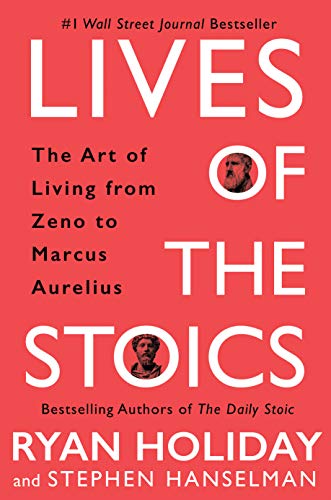
Lives of the Stoics: The Art of Living from Zeno to Marcus Aurelius

that obstacles and limitations—if responded to properly—create opportunities for beauty and excellence.
Stephen Hanselman • Lives of the Stoics: The Art of Living from Zeno to Marcus Aurelius
To Cleanthes, we should be striving to become strong in those four virtues Zeno had talked about: Now this force and strength, when it is in things apparent and to be persisted in, is wisdom; when in things to be endured, it is fortitude; when about worthiness, it is justice; and when about choosing or refusing, it is temperance. In short: Courage.
... See moreStephen Hanselman • Lives of the Stoics: The Art of Living from Zeno to Marcus Aurelius
one’s self-talk must be strict, but never abusive.
Stephen Hanselman • Lives of the Stoics: The Art of Living from Zeno to Marcus Aurelius
Kierkegaard would later make the distinction between a genius and an apostle. The genius brings new light and work into the world. The genius is the prophet. The creator. The apostle comes next—a mere man (or woman) who communicates and spreads this message. Given Cleanthes’s dedication to Zeno, it seems likely that the two were never
... See moreStephen Hanselman • Lives of the Stoics: The Art of Living from Zeno to Marcus Aurelius
Cleanthes loved work and philosophy the same. Indeed, that’s the word the ancients used to describe his industriousness: philoponia—a love of work. Literally, a marrow-deep dedication to honest labor. Not just for money, of course, but also to improve himself.
Stephen Hanselman • Lives of the Stoics: The Art of Living from Zeno to Marcus Aurelius
Anything you do well is noble, no matter how humble. And possibly even more admirable if you deliberately forgo status in the pursuit of what you really love.
Stephen Hanselman • Lives of the Stoics: The Art of Living from Zeno to Marcus Aurelius
He was also the first to express the four virtues of Stoicism: courage, temperance, justice, and wisdom.
Stephen Hanselman • Lives of the Stoics: The Art of Living from Zeno to Marcus Aurelius
Just because someone has anxieties or self-doubts or was taught the wrong things early in life doesn’t mean they can’t become something great, provided they have the courage (and the mentors) to help them change.
Stephen Hanselman • Lives of the Stoics: The Art of Living from Zeno to Marcus Aurelius
That’s what Stoicism is. It’s stretching. Training. To be better. To get better. To avoid one more mistake, to take one step closer toward that ideal. Not perfection, but progress—that’s what each of these lives was about.